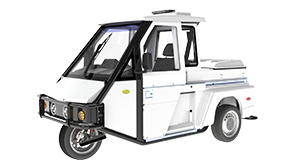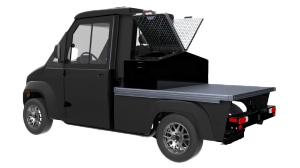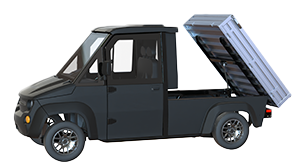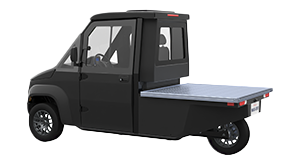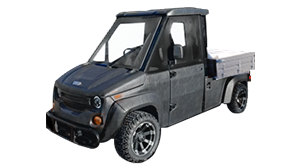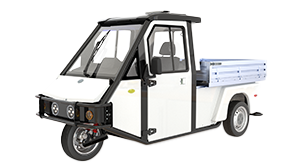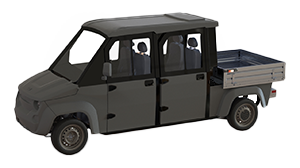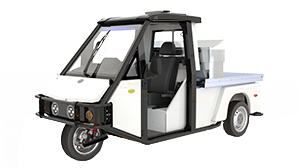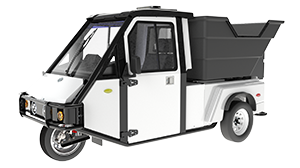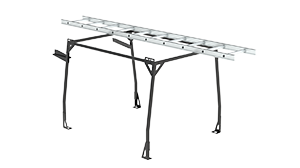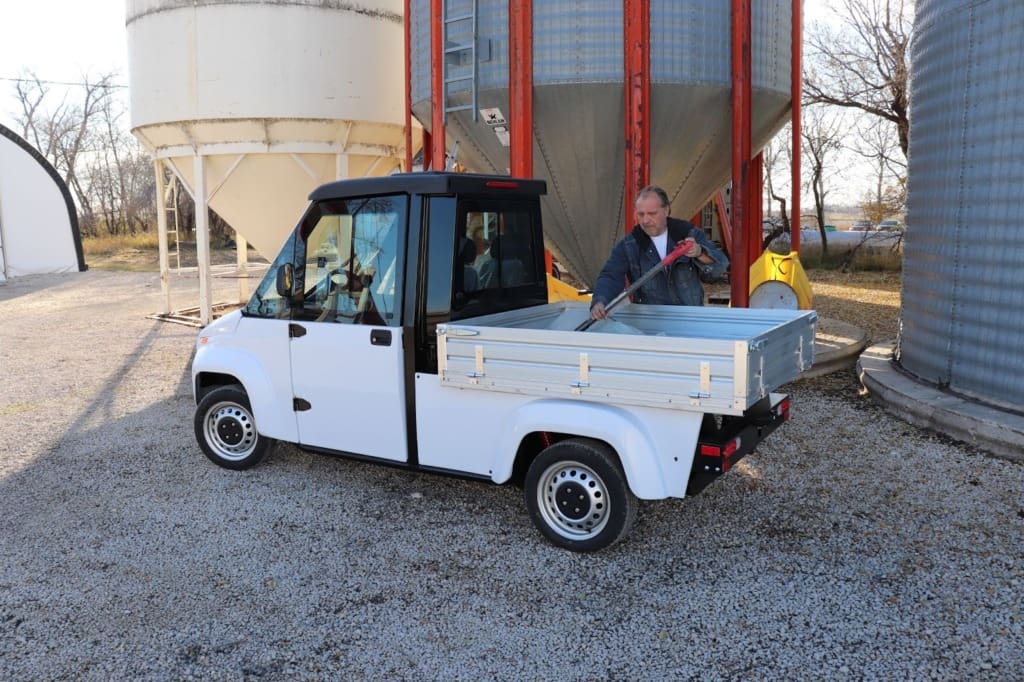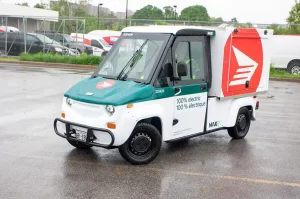Understanding Your Electric Farm Utility Vehicle: Key Components to Inspect
Ensuring the optimal performance of your electric farm vehicle fortunately requires minimal attention, but nevertheless monitoring certain key components is always prudent. These vehicles are designed for efficiency, but like any machine, they benefit from proactive maintenance and monitoring. By keeping an eye on critical systems, you can prevent unexpected downtime and ensure the longevity of your vehicle.
Battery System
Westward Vehicles are outfitted with today’s leading lithium-ion battery technology and it is the heart of any electric farm vehicle, providing the power needed for daily operations. Maintenance needs are minimal, however considering the cost of battery replacement regular checks on the battery’s health are essential for maintaining performance. Monitoring the battery’s charge level, high and low voltage stability, and overall range health ensures that it delivers consistent power. Also, tracking the number of charge cycles can help you gauge when it might be time for a replacement or service to prevent premature battery degradation.
Motor and Controller
Another key area is the PMAC motor and Curtis motor controller, which regulate the vehicle’s power output. These components should be inspected periodically for any signs of wear, unusual noises, or performance issues. Keeping them in good condition ensures that the vehicle’s energy is efficiently converted into power, maintaining the vehicle’s responsiveness and overall efficiency during farm operations.
Battery Care: Maximizing Longevity and Efficiency
Maintaining the battery system of your electric farm utility vehicle is crucial for ensuring long-term performance and efficiency. One of the most important aspects of battery care is developing good charging habits. Regular charging is essential, but it’s important to avoid deep discharges or letting the battery drain to extremely low levels. Ideal battery percentages are in the 20-99% range. After each charge, as the battery approaches full capacity, the battery management system begins to trickle charge and balance high and low cells, the lesser the difference between high and low cell voltage, or battery delta, the better the overall health of the battery. Balance them as much as possible, this function allows the battery to remain in a healthy balanced state for years to come. Leaving the battery on charge over a weekend, can help balance high and low cells. Utilizing Level 2 charging for larger sized battery packs can also optimize battery performance. The quicker charge allows the BMS to spend more time balancing cells.
Temperature Management
Extreme temperatures can have some affect on the longevity and efficiency of lithium-ion batteries. Very high heat can cause the battery to degrade faster, while freezing temperatures can reduce its discharge capacity. The battery management system will protect the battery in such conditions, however to maximize the duration of a healthy battery, it’s essential to store and operate the vehicle in environments where temperatures are moderate and stable, protecting the battery system from damage and ensuring reliable power delivery for farm operations. For hot desert climates, it would be ideal to perform work in the early daytime hours, avoiding afternoon extreme temperature.
Tire Maintenance: Ensuring Optimal Traction and Safety
Tire maintenance is essential for ensuring that your electric farm vehicle performs efficiently across various terrains. The condition of the tires directly affects traction, safety, and overall vehicle handling, especially on rough or uneven farm grounds. Regularly inspecting tires for wear and tear, checking pressure levels, and ensuring proper alignment can prevent accidents and prolong the lifespan of the tires.
Regular Tire Inspection
Conducting regular tire inspections helps avoid premature wear and ensures optimal traction, especially in changing farm conditions. Some key areas to monitor include:
- Tire pressure: Under-inflated tires can increase rolling resistance, reduce efficiency, and make steering more difficult, while over-inflated tires can lead to uneven tread wear.
- Tread depth: Worn-out treads reduce the vehicle’s grip, making it unsafe to operate in wet or slippery conditions.
- Sidewall integrity: Look for cracks, bulges, or punctures in the sidewalls that could indicate impending tire failure.
Turf and Off-Road Tires
Choosing the right type of tires is also critical for maintaining traction and safety in different environments. Turf tires are ideal for soft ground, helping prevent damage to delicate surfaces while offering smooth performance. On the other hand, off-road tires are better suited for rougher terrains, providing enhanced durability and better grip in muddy or uneven conditions. Switching between these tire types based on the season or terrain helps optimize your vehicle’s performance and prolong the life of the tires. Regular rotation of tires can also help in achieving even wear across all wheels.
Charging System: Keeping Your Vehicle Powered and Ready
Maintaining the charging system of your electric farm vehicle is essential for ensuring it’s always ready for work. A reliable and efficient charging process not only keeps the vehicle operational but also helps extend the lifespan of the lithium-ion battery. Regular attention to the charging system can prevent unexpected downtime and ensure smooth operation during farm tasks.
Checking Charging Ports
The J1772 charging port is the gateway through which your vehicle receives power, and it needs to be kept clean and functional. Dirt, debris, or moisture can obstruct proper charging or even damage the port over time. Regularly inspect the port and clean it gently with a dry cloth or compressed air to prevent blockages. If you notice any corrosion or damage, it’s important to address these issues promptly to avoid charging inefficiencies.
Monitoring Charge Times
It’s also useful to monitor the charging times of your vehicle. Any unusual delays in charging could be a sign of an issue with the battery, charger, or port. Be mindful of any deviations from your vehicle’s normal charging cycle and report them for professional inspection if necessary. Prolonged charging times may indicate a decline in the battery’s efficiency or a problem with the charging system itself. Keeping track of regular charge cycles can help you identify these early signs, preventing more serious problems down the line.
Brakes and Suspension: Keeping Your Vehicle Safe and Comfortable
The brake and suspension systems in your electric farm vehicle are critical for both safety and operator comfort, especially when navigating uneven or rough terrains. Regular maintenance of these systems ensures that your vehicle performs optimally, providing smooth handling and reliable stopping power, which is essential for farm work that involves frequent starts, stops, and maneuvering.
Brake Inspection
The automotive-grade disc brakes on Westward’s electric farm vehicles are designed for durability and performance, but they still require regular inspection to ensure they remain responsive. Key areas to monitor include:
- Brake pad wear: Over time, brake pads will naturally wear down. It’s important to check for thinning pads, as worn-out pads can reduce braking power and lead to unsafe driving conditions.
- Brake fluid levels: Low brake fluid can lead to spongy brakes or even complete brake failure. Regularly checking and topping up the fluid helps maintain consistent braking performance.
- Rotor condition: Warped or damaged rotors can cause vibrations during braking, which may affect handling and stop time. Make sure rotors are smooth and undamaged for optimal braking efficiency.
Suspension Checks
The independent suspension system in electric farm vehicles is designed to handle the rough, uneven surfaces often found on farms. However, like brakes, the suspension system needs regular checks to maintain performance and comfort. Key elements to inspect include:
- Shock absorbers: Ensure shock absorbers are functioning correctly to maintain vehicle stability and comfort over uneven terrain. Worn shocks can lead to a bumpy ride and reduce control.
- Suspension alignment: Check for any misalignment or wear in the suspension components that could affect steering and handling. Proper suspension alignment helps the vehicle absorb bumps while keeping the operator comfortable.
Ensuring that both the brake and suspension systems are well-maintained, help you enhance safety, comfort, and performance in daily farm operations.
Cleaning and Protecting Your Electric Farm Vehicle
Regular cleaning and protection of your electric farm vehicle are essential for ensuring its longevity and maintaining optimal performance. Dirt, mud, and other debris can accumulate over time, leading to corrosion and damage if not addressed. Keeping both the exterior and interior clean helps prevent wear and tear while also improving the vehicle’s appearance and functionality.
Regular Washing
Farm environments can expose vehicles to mud, dust, and chemicals that can corrode components over time. Regular washing, especially of the chassis and undercarriage, is critical for preventing rust and ensuring that the vehicle’s mechanical parts remain protected. Use water and a gentle detergent to wash off dirt and grime. Be sure to focus on areas where mud and debris tend to accumulate, such as around the wheels and lower body panels.
Protective Measures
To extend the life of your vehicle, consider implementing protective measures such as using covers or storing the vehicle in a garage or sheltered area. Harsh weather conditions, such as prolonged exposure to rain or sun, can degrade components and damage the battery system. Covering the vehicle when it’s not in use, or storing it in a climate-controlled environment, can help prevent such damage, ensuring your electric farm vehicle is always ready for use.
Remote Diagnostics: Leveraging Technology for Maintenance

Modern electric farm vehicles, like Westward’s, come equipped with remote diagnostics capabilities that significantly improve maintenance and troubleshooting efficiency. These systems allow you to monitor the health of your vehicle in real-time, reducing the need for on-site repairs and minimizing downtime. Remote diagnostics provide insights into potential issues before they escalate, enabling faster interventions.
Utilizing Remote Support
Through remote diagnostics, farmers can access real-time data on their vehicle’s performance, including battery health, motor efficiency, and system status. Westward’s remote support enables technicians to assess and troubleshoot problems without needing to be physically present, reducing delays and costs associated with traditional service calls. This proactive approach to maintenance helps keep your vehicle in top condition.
Monitoring Vehicle Health
Regularly checking diagnostic reports provides crucial information about the condition of your vehicle. Identifying small issues early, such as a drop in battery efficiency or motor performance, can prevent larger problems from developing, ensuring the vehicle operates smoothly during farm tasks.
New Features and Improvements
Beyond bug fixes, software updates, if available, can unlock new capabilities, such as enhanced energy management features or better integration with remote diagnostics. These updates may also improve the responsiveness of the vehicle’s motor and enhance battery efficiency, allowing it to last longer between charges. Regularly updating your software ensures you’re maximizing the full potential of your electric farm vehicle while maintaining long-term reliability.
Seasonal Maintenance: Preparing for Different Farming Conditions
Seasonal changes can have a significant impact on the performance of your electric farm vehicle. To ensure the vehicle remains efficient and reliable throughout the year, specific maintenance tasks should be performed for both winter and summer conditions. Proper seasonal preparation can help avoid unnecessary downtime and ensure smooth operations in any weather.
Winter Preparation
Cold weather can affect the battery performance and overall operation of electric vehicles. To prepare for winter, consider the following:
- Install winter tires: Improve traction on icy or snowy surfaces by switching to tires designed for winter conditions.
- Battery insulation: Protect the lithium-ion battery from freezing temperatures by ensuring it’s stored in a climate-controlled area or using battery blankets to insulate it.
- Regular charging: Keep the battery fully charged to avoid deep discharges, which can reduce battery life in cold weather. Ideally charge indoors in sub-freezing weather, newer models may have battery heating systems integrated.
Summer Preparation
In hotter months, excessive heat can also stress the battery and other vehicle components. Some key summer maintenance tips include:
- Monitor battery temperature: Avoid exposing the vehicle to direct sunlight for long periods, which can overheat the battery.
- Inspect tire pressure: Heat can cause tires to expand, so regularly check and adjust tire pressure during the summer months for optimal performance.
Contact us to learn more about extending the life of your electric farm vehicle and ensure it continues to operate smoothly, regardless of weather conditions.
Planning for Long-Term Maintenance: Building a Preventive Maintenance Schedule
Establishing a preventive maintenance schedule is key to ensuring your electric farm vehicle runs efficiently over the long term. A well-planned schedule helps you avoid unexpected breakdowns and prolongs the lifespan of critical components such as the battery, motor, and suspension system. Every vehicle arrives with an owners manual, check the manual for recommended maintenance.
Creating a Maintenance Calendar
Building a maintenance calendar involves setting regular intervals for tasks like battery checks, tire rotations, brake inspections, and software updates. Consistent monitoring and routine inspections of these essential systems ensure that small issues are detected early before they become major problems. Including seasonal adjustments in the schedule, such as preparing for winter and summer conditions, keeps the vehicle ready for year-round use.
Service Manual and Professional Support
Keeping the service manual readily available ensures you have detailed guidance on part replacements, specifications, and troubleshooting. For more complex repairs or system upgrades, it’s also important to have access to professional support to maintain the vehicle’s performance and longevity. This combined approach helps ensure your electric farm vehicle operates at peak efficiency for years to come. Service manuals are available from local authorized dealers.
